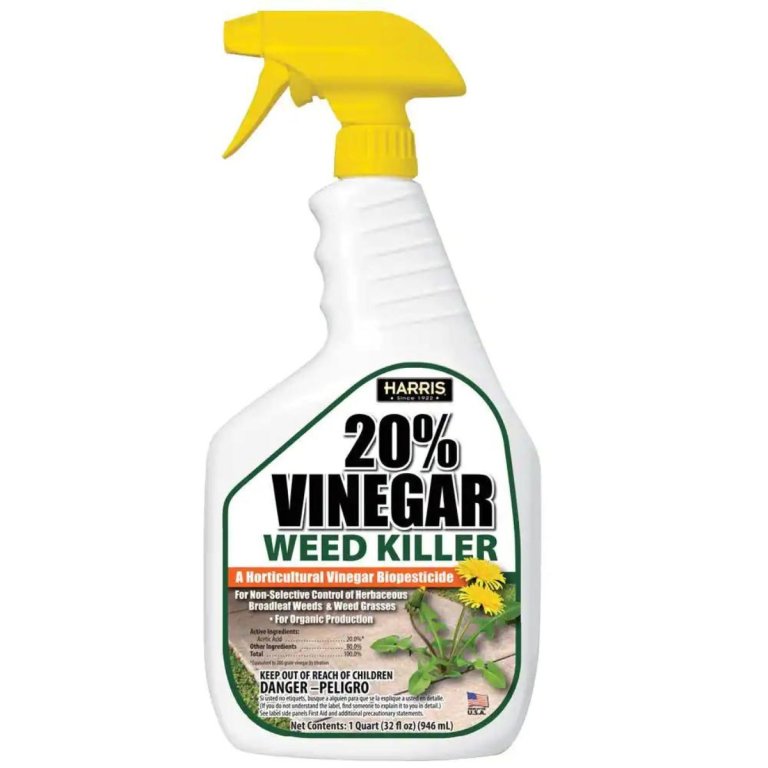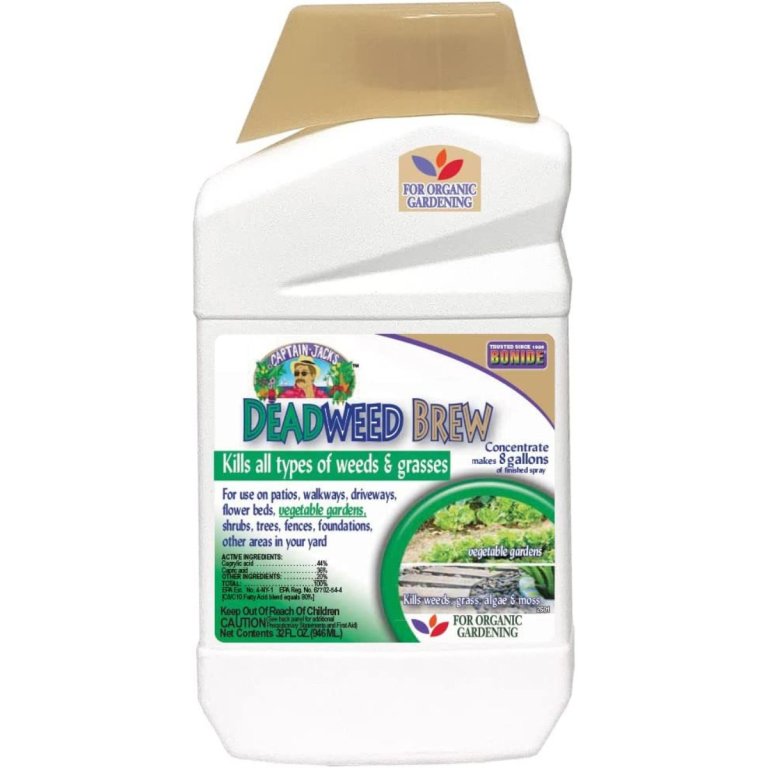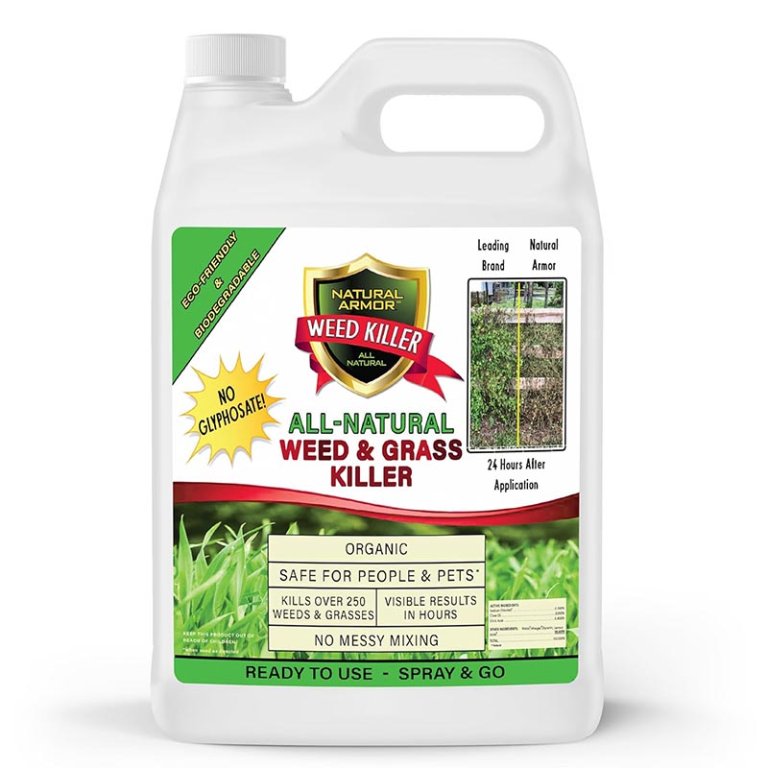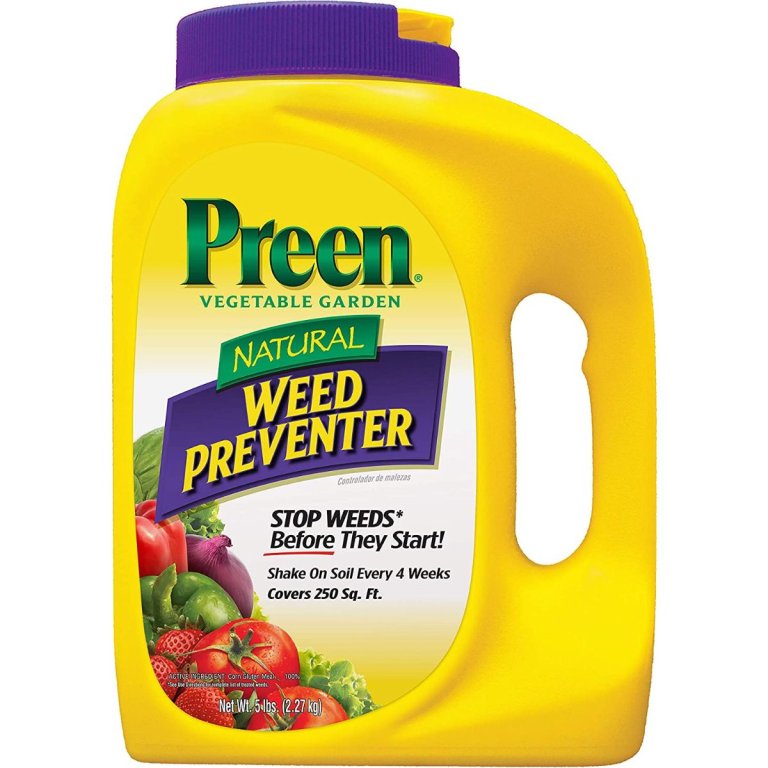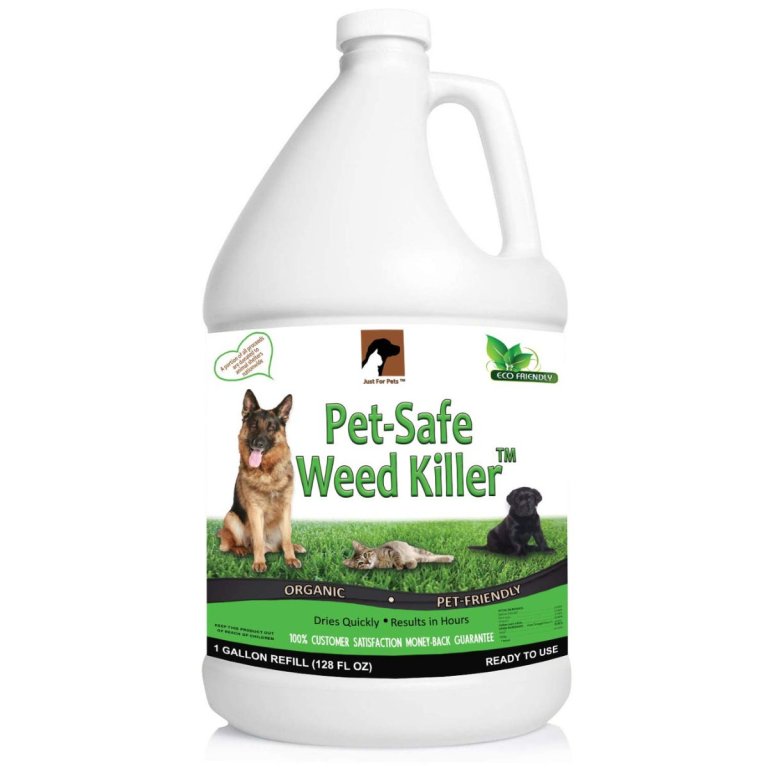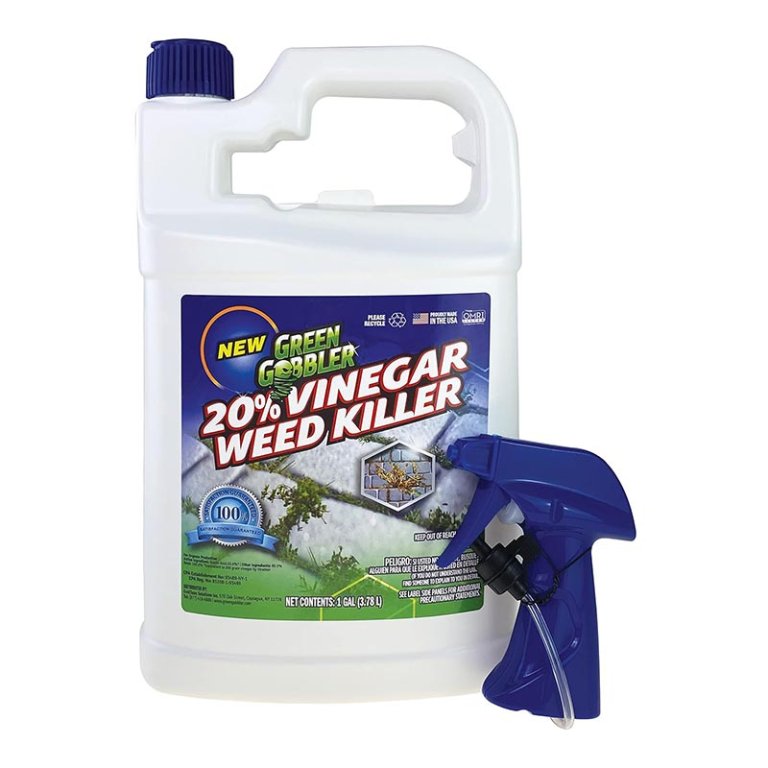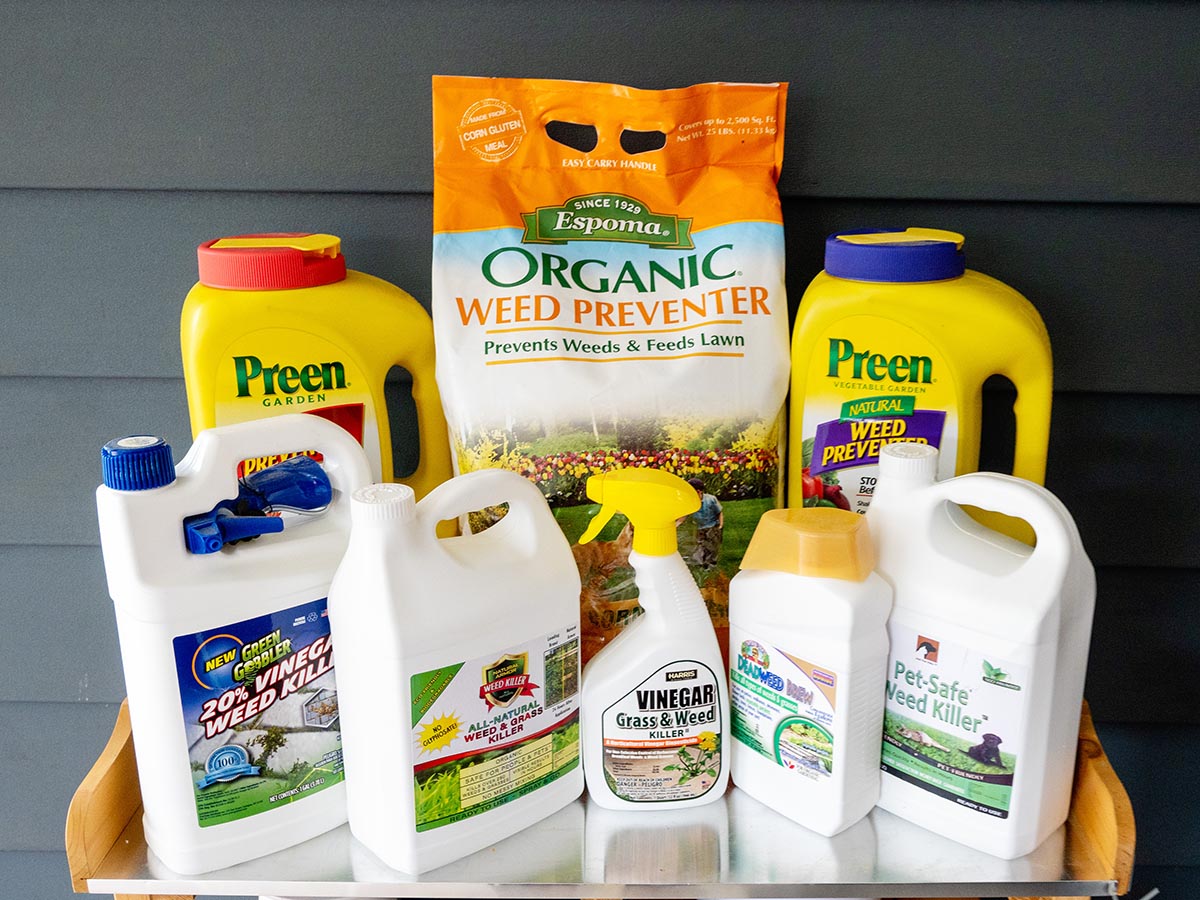
We may earn revenue from the products available on this page and participate in affiliate programs. Learn More ›
Weeds spread rapidly across gardens and crowd out desirable plants, but finding a suitable weed killer for flower beds can be a challenge. We recently tested eight weed killers from reputable brands, big and small, that do not contain chemicals that harm the soil and pose health risks to people, animals, or insects when used appropriately. The best weed killers for flower beds are safe, sustainable, and effectively eradicate unwanted grasses and weeds when gardening.
Our favorite nontoxic weed killer is the Espoma Organic Weed Preventer Plus Lawn Food, thanks to its natural composition, which is safe to handle, won’t harm wildlife or soil, and is very effective. We considered all the factors shoppers will want to consider before buying these products and listed our top picks for the best weed killer. Keep reading to learn what to look for when shopping for the best weed killers for flower beds and why the following picks are among the options available.
- BEST OVERALL: Espoma Organic Weed Preventer Plus Lawn Food
↓ Jump to Review - BEST BANG FOR THE BUCK: Harris 20% Vinegar Weed Killer
↓ Jump to Review - BEST FOR PERENNIAL BEDS: Bonide Captain Jack’s Deadweed Brew Concentrate
↓ Jump to Review - BEST ALL-NATURAL: Natural Armor All-Natural Weed & Grass Killer
↓ Jump to Review - BEST SHAKER JUG: Preen Natural Vegetable Garden Weed Preventer
↓ Jump to Review - SAFEST FOR PETS: Just For Pets Pet-Safe Weed Killer
↓ Jump to Review - BEST CHEMICAL-FREE: Green Gobbler 20% Vinegar Weed & Grass Killer
↓ Jump to Review - BEST SYNTHETIC OPTION: Preen Garden Weed Preventer
↓ Jump to Review
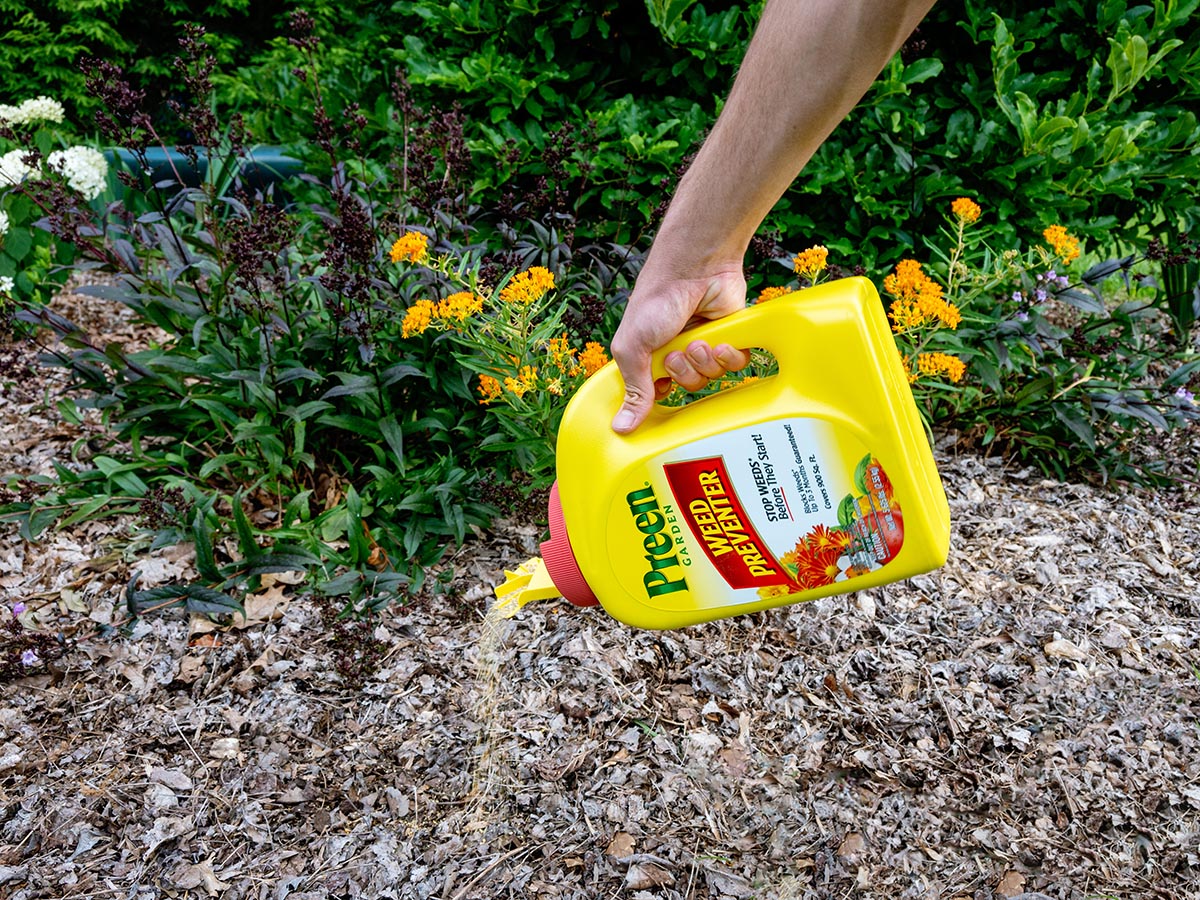
| Form | Type | Active Ingredient | |
| Espoma Organic Weed Preventer Plus Lawn Food | Granular | Pre-emergent | Corn gluten meal |
| Harris 20% Vinegar Weed Killer | Liquid | Nonselective | Acetic acid (main component of vinegar) |
| Bonide Captain Jack’s Deadweed Brew Concentrate | Spray | Nonselective | Caprylic and capric acid |
| Natural Armor All-Natural Weed & Grass Killer | Ready-to-use liquid | Nonselective | Sodium chloride and citric acid |
| Preen Natural Vegetable Garden Weed Preventer | Granular | Nonselective | Corn gluten meal |
| Just For Pets Pet-Safe Weed Killer | Ready-to-use liquid | Nonselective | Acetic acid |
| Green Gobbler 20% Vinegar Weed & Grass Killer | Granular | Nonselective | Acetic acid |
| Preen Garden Weed Preventer | Granular | Nonselective | Trifluralin |
Our Top Picks
In compiling this list, we looked for the best weed killer for flower beds that won’t kill flowers. However, due to the nonselective nature of most formulas, we adjusted our criteria to emphasize products that are environmentally safe, sustainable, and easy to use.
Best Overall
Espoma Organic Weed Preventer, 25 Pounds CGP25
What We Like
- Offers an organic alternative to chemical weed preventers
- Provides organic nitrogen
- Nontoxic, making it safe for households with pets and children
What We Don’t Like
- Attracts wildlife, especially squirrels and rodents
Product Specs
- Form: Granular
- Type: Pre-emergent
- Active ingredient: Corn gluten meal
Our Ratings: Application 5/5; Effectiveness 5/5; Value 5/5
Home gardeners and landscapers who have planted their flower beds and want to prevent new weeds may be interested in the Espoma Organic weed preventer. This nonselective granular formula is made from 100 percent corn gluten, often used as a natural pre-emergent herbicide and one of the best weed killers that won’t kill grass.
Espoma Organic weed killer is a top choice because it is effective, easy to use, and safe for use around children and pets. Timing is crucial when using a pre-emergent. This product has corn gluten meal as its active ingredient, inhibiting the root development of sprouting weed seeds. This reduces the emergence of new weeds. It must be applied at specific times of the year—specifically before weed seeds germinate, typically early in the spring and again in the fall, to maximize its effectiveness to kill weeds, not grass. We applied it to our flower beds in the spring before the summer weeds could take hold. We also used it with decorative mulch, sprinkling the corn gluten over the soil in the flower bed before adding the mulch on top. The result was exactly what we wanted—no weeds in our flower beds when the weather warmed up.
Although this organic product is labeled a lawn weed killer, it will function the same way in a flower bed by helping prevent weed seeds from sprouting. However, it won’t kill established weeds, so those must be removed before using this organic product. Additionally, as its primary ingredient is corn gluten, it may attract squirrels and rodents. Any unused preventer must be stored in a rigid plastic container. Even though we encountered a few pests looking for food, the benefits of this reliable product make it all worthwhile.
Get the Espoma Organic weed killer for flower beds at Ace Hardware or True Value.
Best Bang for the Buck
Harris 20% Vinegar Weed and Grass Killer
What We Like
- Comes ready to use
- Effective at killing young weeds before they establish deeper root systems
- Effective for clearing large areas with diverse weed types
What We Don’t Like
- Less effective on established weeds with hearty roots
Product Specs
- Form: Liquid
- Type: Nonselective
- Active ingredient: Acetic acid (main component of vinegar)
Our Ratings: Application 5/5; Effectiveness 4/5; Value 5/5
To banish weeds in and around flower beds in an economically—and ecologically—friendly way, shoppers will want to consider Harris 20% vinegar weed and grass Killer. It features concentrated acetic acid (vinegar) as its active ingredient. This affordable weed killer comes in a 32-ounce spray bottle, allowing users to apply the product directly on the offending weeds, making it our pick for one of the best weed killer sprays.
During our testing, the Harris weed and grass killer proved its effectiveness, particularly against young weeds. While it may require a little patience, it’s worth the wait. This non-instant solution works over a few days, making it most effective at killing young weeds before they establish deeper root systems. Apply it to weeds that have recently sprouted and are vulnerable for best results. It’s not super effective at killing established weeds. However, this pick is the best weed spray we tried and is perfect for quickly clearing a flower bed of young weeds before planting your flowers.
This is a nonselective weed killer, meaning it can kill or damage any plant it comes into contact with, including your desirable flowers. If necessary, consider shielding those pretty posies with plastic film during application, removing the plastic after the solution has dried. Although it is considered safe, wearing protective clothing and something to shield your eyes is advisable. Vinegar is corrosive and can cause eye damage and skin irritation. However, if used appropriately, the Harris weed and grass Killer is an effective spray weed killer to keep in your gardening arsenal.
Get the Harris weed killer for flower beds at The Home Depot or Harris.
Best for Perennial Beds
Bonide Captain Jack’s Deadweed Brew Concentrate
What We Like
- Safe for use with metal sprayers, as it does not cause corrosion or damage
- Quickly causes the dieback of both annual and perennial weeds
- Concentrated formula can be diluted to make up to 32 gallons
What We Don’t Like
- May require multiple applications for effective long-term control
Product Specs
- Form: Spray
- Type: Nonselective
- Active ingredients: Caprylic and capric acid
Our Ratings: Application 4/5; Effectiveness 5/5; Value 4.5/5
The active ingredient of Captain Jack’s Deadweed Brew concentrate by Bonide is capric acid, a saturated fat derived from coconut and palm kernel oils that kills broadleaf and grassy weeds by drying out the foliage. Available in a quart-size package with a dedicated measuring cup, this concentrate can make up to 8 gallons of spray-on contact weed killer when mixed with water.
Captain Jack’s concentrate kills several weeds over large areas without noxious odors. It can be used against annual and perennial broadleaf weeds and grasses, and it works in temperatures as low as 40 degrees Fahrenheit.
After testing, we found that Captain Jack’s effectively eliminated weeds in our flower bed. The concentrate is easy to mix and apply, making the application straightforward without any complications. You just need to follow the mixing instructions accurately. Once diluted, it’s ready to use and coats the leaves evenly, providing good coverage. It worked impressively on newly emerged weeds such as dandelion and clover, showing visible results within hours. However, its effectiveness on established weeds with deeper roots can be limited, requiring repeated applications. Overall, it’s a reliable product that delivers on its promises, provided you handle it carefully due to its nonselective nature—it will kill your flowers if not correctly applied.
Get the Bonide weed killer for flower beds at Amazon.
Best All-Natural
Natural Armor All-Natural Weed & Grass Killer
What We Like
- Offers a safer alternative to chemical herbicides
- Lacks glyphosate, diminishing the risk of toxicity and environmental pollution
- Applicable in diverse settings such as gardens, driveways, and along fences
What We Don’t Like
- Acts slower than chemical alternatives due to its natural composition
Product Specs
- Form: Ready-to-use liquid
- Type: Nonselective
- Active ingredients: Sodium chloride and citric acid
Our Ratings: Application 4/5; Effectiveness 4/5; Value 4/5
Natural Armor weed and grass killer is completely free from glyphosate and other harsh chemicals, making it an excellent choice for those who prefer a more eco-friendly approach. Its ability to target over 250 types of weeds and grasses means it’s not only effective but also incredibly powerful despite its natural formulation.
The weed killer features active ingredients sodium chloride and citric acid to kill weeds effectively. During testing, we found that it easily killed younger weeds but needed repeated applications to destroy established weeds. It acts quickly, showing visible results fast, which is always satisfying when trying to keep your garden looking its best. The weed killer is a concentrate, so you must mix it before use.
Overall, we recommend Natural Armor to any gardener looking for a reliable, natural solution to weed control. Its plant-safe formulation means you don’t have to worry about harming pollinators or wildlife while tackling unwanted weeds. However, it’s important to note that it’s a nonselective weed killer, so careful application is necessary when used around desirable plants.
Get the Natural Armor weed killer for flower beds at Amazon or Natural Armor.
Best Shaker Jug
Preen Natural Vegetable Garden Weed Preventer
What We Like
- Safe to use around established vegetables, herbs, and fruit
- Easy-to-apply shaker lid
- Lasts up to 3 months
What We Don’t Like
- Won’t kill existing weeds
- Can attract squirrels and other rodents
Product Specs
- Form: Granular
- Type: Nonselective
- Active ingredient: Corn gluten meal
Our Ratings: Application 5/5; Effectiveness 5/5; Value 5/5
Like all Preen weed preventers, this pre-emergent product stops weed seeds from sprouting, but this one is entirely natural. It contains only corn gluten, which is known for preventing seed germination. This Preen product can be used in flower beds and around other types of plants—including fruits and vegetables.
This natural product comes in granular form and is easy to apply with a shaker lid for fuss-free, uniform application. A single application will keep weed seeds from sprouting for 6 weeks. It can be used on bare soil or with mulch, such as shredded bark or pea gravel. Like the Espoma organic weed preventer, this pre-emergent effectively stops all seeds from sprouting. Seeds of desirable plants will only grow if sown in soil treated with corn gluten once the granules biodegrade to the extent that they no longer act as a barrier to seed germination.
In our test, we applied it to our vegetable garden before adding transplant seedlings. Our plants were fine, and new weeds did not sprout. Spreading it is a cinch since the corn gluten meal is pelletized. No special equipment is needed—just open and shake. However, since it is a corn gluten meal, it does attract squirrels and other rodents.
Get the Preen Natural weed killer for flower beds at Amazon, Tractor Supply Co., or The Home Depot.
Safest for Pets
Just For Pets Pet-Safe Weed Killer
What We Like
- Weed killer is safe for pets once dried
- Doesn’t stay in the soil
- Kills weeds naturally with vinegar
What We Don’t Like
- No sprayer included
- Repeated application necessary for established weeds
Product Specs
- Form: Ready-to-use liquid
- Type: Nonselective
- Active ingredient: Acetic acid
Our Ratings: Application 4/5; Effectiveness 5/5; Value 4/5
This herbicide product’s active weed-killing ingredient is acetic acid—or vinegar, as it’s commonly known—plus some essential oil and citrus to give it a pleasing smell. It’s safe for pets and the environment. Still, as a nonselective organic weed killer, it can harm desirable plants, so apply carefully.
We have used vinegar-based weed killers in the past and knew that the active ingredient was effective at killing weeds and grasses. Similarly, Just For Pets pet-safe weed killer easily killed weeds, especially young, less established weeds. Repeated application was necessary to kill more established weeds. While the liquid is ready to use with no mixing or dilution required, there’s no included sprayer. You’ll want to pour the liquid into a trigger-type hand sprayer or pump-type garden sprayer to use it. For the best results, we found that we needed to saturate weeds thoroughly on a dry, sunny day and allow the product to dry completely before letting pets play in the area.
Get the Just For Pets weed killer for flower beds at Amazon.
Best Chemical-Free
Green Gobbler 20% Vinegar Weed & Grass Killer
What We Like
- Organic Materials Review Institute listed and approved for organic use
- Full-strength liquid; no diluting
- Made from ethanol distilled from corn grain; glyphosate-free
What We Don’t Like
- Very strong vinegar odor
- Multiple applications are required for well-established weeds
Product Specs
- Form: Granular
- Type: Nonselective
- Active ingredient: Acetic acid
Our Ratings: Application 5/5; Effectiveness 4/5; Value 5/5
If you need a potent weed killer that doesn’t contain chemicals, consider trying out the Green Gobbler 20 percent vinegar weed and grass killer. It’s packed with a high concentration of vinegar, making it an effective weed and grass killer for flower beds. Most importantly, it’s free from harmful chemicals, phosphates, or bleaches that could harm the soil or the environment.
Unlike regular household vinegar, which contains 5 percent acetic acid, Green Gobbler has a significantly higher concentration, making it efficient in eliminating different types of weeds, including dandelions and crabgrass. This natural product comes in liquid form and can be easily applied with a handheld or pump-type garden sprayer. It’s a full-strength liquid, so no dilution is necessary.
We’ve used several vinegar-based weed killers and found that Green Gobbler works well in eradicating young weeds. Since it is a vinegar weed killer, multiple applications may be needed to eliminate established weeds. Be cautious to prevent overspray from contacting desired flowers, shrubs, or grass, as this nonselective weed killer can damage or kill them. It does have a strong vinegar odor, so take care to spray it downwind. Overall, we found that this weed killer performed well and will be a part of our environmentally safe herbicide collection.
Get the Green Gobbler weed killer for flower beds at Amazon or Green Gobbler.
Best Synthetic Option
Preen Garden Weed Preventer
What We Like
- Stops weeds before they start
- Easy-to-apply shaker-lid
- Safe to use around edible plants
What We Don’t Like
- Won’t kill existing weeds
Product Specs
- Form: Granular
- Type: Nonselective
- Active ingredient: Trifluralin
Our Ratings: Application 5/5; Effectiveness 5/5; Value 5/5
Preen Garden weed preventer is not an all-natural product, but it’s one of the best granular weed killers on the market. It is safe in vegetable gardens and ornamental flower beds. Its nonselective granular formula is easy to use. Sprinkle it around the base of desirable plants and over bare soil in a flower bed, then lightly water it to allow the granules to dissolve and form a barrier.
You can also sprinkle Preen Garden weed preventer over mulch, such as shredded bark or pea gravel, and it will dissolve to form a barrier that prevents weed seeds from sprouting. However, it is important to note that this product will also stop desirable seeds from sprouting, so care should be taken when spreading it. Preen’s chemical formula will work continuously for up to 3 months, after which it should be reapplied.
Unlike Preen Natural vegetable garden weed preventer, which prevents seeds from germinating, Preen Garden weed preventer is a pre-emergent herbicide that stops seedlings from establishing. We love this product because it can be used after laying down mulch and throughout the growing season once your desirable plants are established. It is an effective tool in our weed-management system, but it is important to note that this pre-emergent herbicide will not kill existing weeds. If any weeds have already taken root, use a post-emergent product or pull them by hand before treating the bed with Preen. Overall, it’s an effective product that we highly recommend.
Get the Preen Garden weed killer for flower beds at Amazon, Ace Hardware, or Target.
Or, DIY Your Own Weed Killer
Commercial weed killers are relatively new. Home growers have used natural methods of controlling unwanted weeds for many years, including:
- Borax: When mixed with water, the high alkaline content of this natural mineral will often kill weeds just by spraying the solution on the weed’s foliage. Care should be taken not to overspray on desirable flowers, as it will kill them too.
- Salt: While this is a natural herbicide, it must be used judiciously to avoid endangering flowers and other desirable plants. Mix salt with water and spray weeds, but never overspray on desirable plants.
- Vinegar: Some of the products in our lineup contain vinegar because it’s a natural weed killer. Full-strength household white vinegar can also be used. Respraying may be necessary to kill weeds completely. (Do not spray desirable flowers.)
Some of the abovementioned options can be mixed with water and sprayed on unwanted weeds to kill them. Adding a couple of drops of liquid dish soap to the mix will help keep the solution on leaves longer and give natural weed killers a chance to work.
Or, DIY Your Own Weed Killer for Flower Beds
Commercial weed killers are relatively new. Home growers have used natural methods of controlling unwanted weeds for many years, including:
- Borax: When mixed with water, the high alkaline content of this natural mineral will often kill weeds just by spraying the solution on the weed’s foliage. Care should be taken not to overspray on desirable flowers, as it will kill them too.
- Salt: While salt is a natural herbicide, it must be used judiciously to avoid endangering flowers and other desirable plants. Mix salt with water and spray weeds, but never overspray on desirable plants.
- Vinegar: Some of the products in our lineup contain vinegar because it’s a natural weed killer. Full-strength household white vinegar can also be used. Respraying may be necessary to kill weeds completely. (Do not spray desirable flowers.)
Some of the abovementioned natural options can be mixed with water and sprayed on unwanted weeds to kill them. Adding a couple of drops of liquid dish soap to the mix will help keep the solution on leaves longer and give natural weed killers a chance to work.
Jump to Our Top Picks
Before You Buy a Weed Killer
Commercial weed killers have stern warnings on their product labels: it’s a violation of Federal law to use this product in a manner inconsistent with its labeling. Many weed killers for lawns and gardens alike contain toxic chemicals that can harm humans, pets, and the environment if not applied correctly. Using these products in a safe, responsible manner is essential.
As with all Bob Vila solutions, conservation and sustainability are our most important focus. This is especially true when it comes to growing flowers because honey bees visit brightly colored blossoms daily. Any chemicals bees pick up are carried back to their hives, which can destroy an entire colony. We aim to give growers the tools they need to produce bountiful blooms safely and responsibly. Shoppers will want to start with the least toxic methods of weed control and prioritize solutions that will help ensure the health and longevity of the planet.
How We Tested the Best Weed Killers for Flower Beds
| Testing Stats | |
| Products tested: | 8 |
| Hours spent testing: | 1 hour hands on, 2 weeks observation |
| Tests performed: | 3 |
| Price range: | $12 to $45 |
To find the best weed killers for flower beds, we tested each product and scored them based on a detailed rubric. We measured ease of application, weed-killing effectiveness, and overall value. We evaluated the simplicity of application by considering factors like the spray nozzle’s design, ease of hand spreading, and the clarity of instructions.
For our tests, we applied the flower bed weed killers to designated sections to measure their effectiveness. For post-emergent weed killers, we monitored weed die-off speed and thoroughness of weed removal over 2 weeks. For pre-emergent weed killers, we monitored the product’s effectiveness in preventing weeds from sprouting. In addition, we considered the product’s overall value by calculating its cost per unit, coverage area, and duration of effectiveness. Each product was scored on a scale of 1 to 5.
| Application | Effectiveness | Value | |
| Espoma Organic Weed Preventer Plus Lawn Food | 5/5 | 5/5 | 5/5 |
| Harris 20% Vinegar Weed Killer | 5/5 | 4/5 | 5/5 |
| Bonide Captain Jack’s Deadweed Brew Concentrate | 4/5 | 5/5 | 4.5/5 |
| Natural Armor All-Natural Weed & Grass Killer | 4/5 | 4/5 | 4/5 |
| Preen Natural Vegetable Garden Weed Preventer | 5/5 | 5/5 | 5/5 |
| Just For Pets Pet-Safe Weed Killer | 4/5 | 5/5 | 4/5 |
| Green Gobbler 20% Vinegar Weed & Grass Killer | 5/5 | 4/5 | 5/5 |
| Preen Garden Weed Preventer | 5/5 | 5/5 | 5/5 |
Why We Didn’t Recommend Weed Killers With Glyphosate
We prioritize products without harmful chemicals like glyphosate. Glyphosate-based herbicides can contribute to environmental degradation by binding to soil particles, which reduces microbial diversity and fertility. Additionally, they can accumulate in water bodies, negatively affecting aquatic life and reducing overall biodiversity, especially in freshwater ecosystems. Other common weed-killer options include Roundup, Spectracide, and Ortho GroundClear. However, due to environmental concerns and health risks associated with their chemical ingredients, they do not meet our sustainability guidelines and are not recommended in our top picks.
What to Consider When Choosing a Weed Killer for Flower Beds
Before buying a popular weed killer for flower beds from a store shelf, shoppers will want to consider several factors. Will it damage the soil? Are the ingredients harmful to humans and animals, too? These questions should be answered before making a selection. Here are a few factors shoppers will also want to consider when shopping for a weed killer for flower beds.
Selective vs. Nonselective
Weed killers come in two primary types: selective and nonselective.
- Selective: Just as it sounds, a selective weed killer targets only specific types of weeds but is designed not to kill others—or desirable plants. Read labels carefully to determine which plants a selective weed killer will affect and which ones will not be harmed.
- Nonselective: This type of herbicide is designed to kill all kinds of plants—weeds and flowers alike. It’s well suited for killing weeds in a bed before desirable flowers are planted there. It can also be used along the border of a bed to keep invasive weeds from creeping into the flower bed. Care must be taken that desired plants and flowers do not come into contact with a nonselective herbicide.
Pre-Emergent vs. Post-Emergent
This distinction refers to whether existing weeds need to be destroyed or whether the gardener hopes to prevent them from taking root.
- Pre-emergent: One of the most efficient ways of keeping flower beds weed-free is to apply a pre-emergent to the soil after the ornamental plants are established. Pre-emergents, such as those made by Preen, don’t kill weeds that are already growing. Instead, they form a barrier in the soil that prevents weed seeds from sprouting. However, don’t apply a pre-emergent to the soil if planning to plant flower seeds, as the product will also keep desirable seeds from sprouting. Pre-emergent products are often labeled as “weed preventers.”
- Post-emergent: Both selective and nonselective weed killers fall into the post-emergent category of herbicides because they’re designed to kill existing plants. Post-emergent weed killers do not keep weed seeds from sprouting.
Contact vs. Systemic
Designed to kill all plants, nonselective herbicides are also classified as either contact or systemic. These terms don’t always appear on product labels, though.
- Contact: This should be sprayed directly on as much of the weed’s foliage as possible, where it works to shock the plant and kill it. Precipitation can potentially wash the herbicide off before it does its job, so anyone using this type of product will want to avoid doing so on rainy days.
- Systemic: A systemic weed killer is sprayed on a plant’s leaves and is absorbed by the foliage, traveling through the main stem to the roots and killing the plant. While effective at killing weeds, a potential downside is the risk of the product spreading to the roots of desirable plants, killing them, too. Shoppers will want to check the label for claims such as “kills all the way to the roots.”
Natural vs. Chemical
Chemical weed killers are generally more dangerous to humans, animals, and the environment than natural varieties. Unfortunately, chemical weed killers are often also more effective than natural types, like salt or vinegar. A natural herbicide, for example, may require two or more doses to kill weeds compared to a synthetic one that contains glyphosate, which may only require one dose.
While some gardeners will DIY their own effective natural weed killer by creating a vinegar, salt, and dish soap solution (as mentioned above), a commercial product does offer grab-and-spray convenience.
However, no weed-killing product—even a natural one—is completely harmless because accidental overspray may kill desirable plants. Plus, some all-natural products may irritate the skin of humans who are sensitive to the ingredients. While natural products are less harmful overall, it’s imperative to carefully follow the application instructions for any herbicide. The most environmentally friendly method of weed removal is a manual one.
Method of Application
Application methods will vary based on the type of weed killer selected.
- Direct spray: Available in spray bottles or refill jugs, this ready-to-use formula needs no diluting and can be applied via a trigger sprayer or a pump-type garden sprayer.
- Dilute and spray: A cost-effective option suited to treating large areas of weeds, dilute-and-spray liquids come in concentrated liquid form and are mixed with plain water in a pump-type sprayer. Diluting requires measuring and mixing as well as purchasing a pump or hand sprayer for application—perhaps this is why ready-to-use formulations are more popular.
- Spread: Available in granular form, this type of weed killer requires the use of a drop spreader or a hand applicator. Pre-emergent products often come in granular form: The user sprinkles the granules in the flower bed after the desirable plants are established, and the granules dissolve and form a barrier that keeps seeds from sprouting.
FAQs
Flower beds are at their most striking when they’re full of beautiful blooms—not weeds. Gardeners are always free to use the time-honored tradition of hand weeding, but for those who’d like a little assistance, herbicides can help. Those who are new to cultivating flowers are likely to have a few questions. Here are some answers.
A flower bed can’t be entirely weed-proof, but weeds can be reduced by applying a pre-emergent herbicide to the bed after desirable plants are established but before weeds sneak in.
Unwanted weeds compete for vital nutrients that ornamental plants need to produce large, colorful blooms. Plus, a weed-free flower bed greatly beautifies any yard.
A selective weed killer that targets just grasses is one of the best ways to stop grass invasion without harming flowers.
Only if the weed killer is a selective product designed not to harm plants. If it’s nonselective, it will kill beneficial plants as well as weeds.
Yes, and they’re better for the environment. We always suggest using natural weed killers before trying any chemical products.
It varies. Natural weed killers are generally safer than chemical-based weed killers, but always check the label to be sure.
Yes, but it is important to take a few precautions. Apply directly to weeds with a brush or targeted spray to avoid overspray. Follow the manufacturer’s instructions for application rates and methods.
Meet the Tester
With her green thumb and knack for DIY, Debbie Wolfe has transformed her Georgia acreage into a plant haven. She’s always on the lookout for handy garden tools to keep her green space looking its best!
Additional research provided by Glenda Taylor.




